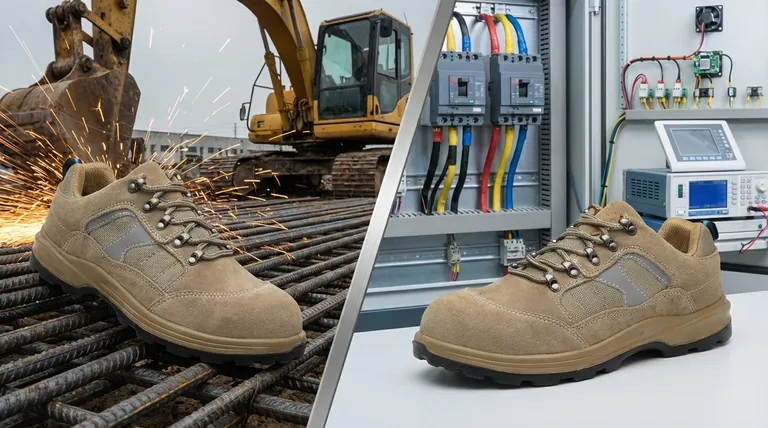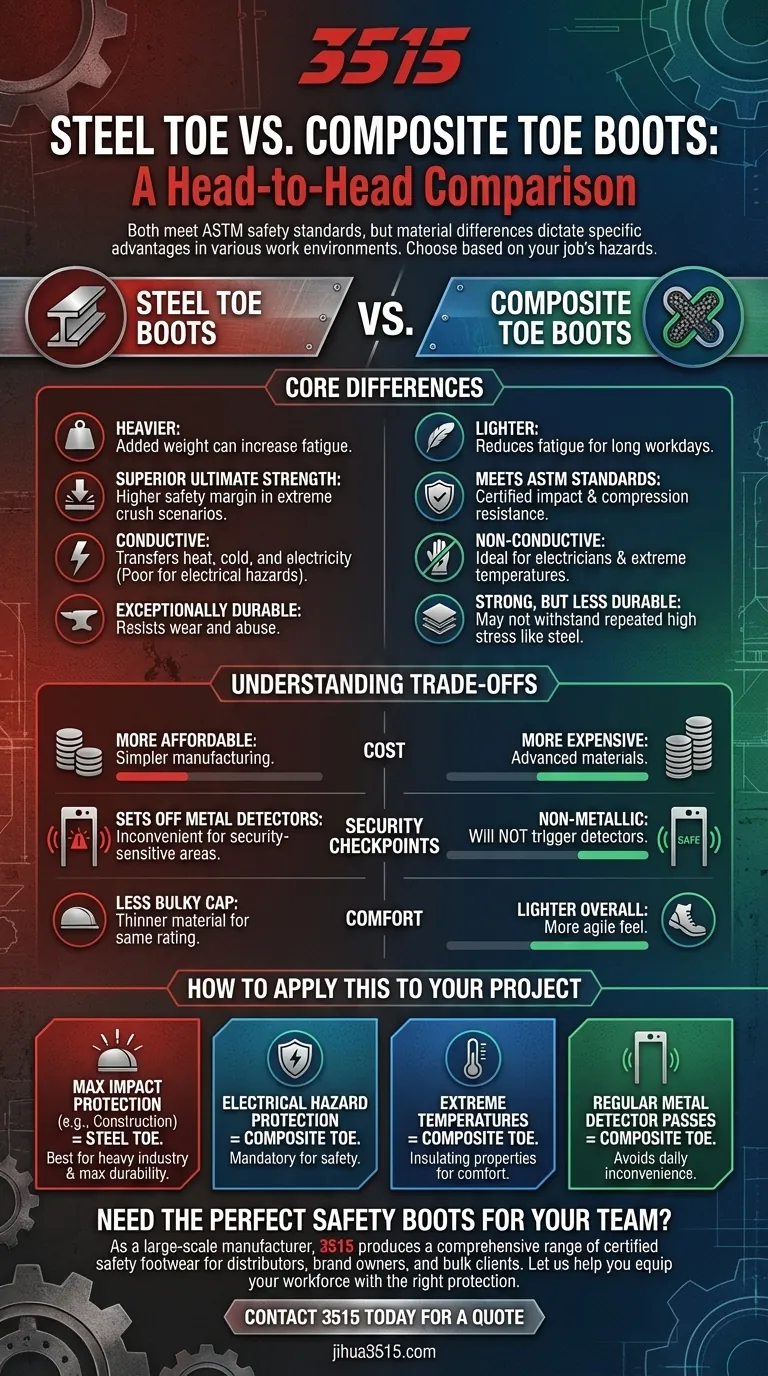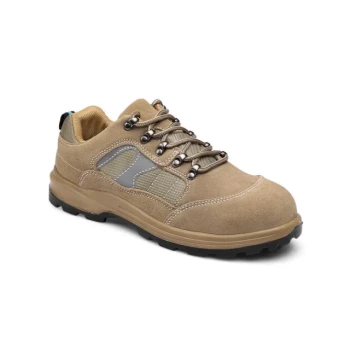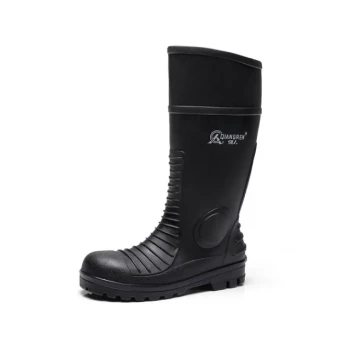The fundamental difference is the material used in the protective cap. Steel toe boots use a reinforced steel cap, offering maximum protection. Composite toe boots use non-metallic materials like carbon fiber, Kevlar, or specialized plastic, which creates a lighter, non-conductive alternative. Both are required to meet the same ASTM safety standards for impact and compression, but their material differences lead to distinct advantages in specific work environments.
Choosing between steel and composite toe boots is not about which is universally "better," but which is better for your specific job. The decision requires balancing the raw strength and durability of steel against the lighter weight, electrical safety, and temperature insulation of composite materials.

Core Differences: A Head-to-Head Comparison
Understanding the key attributes of each material is the first step in making an informed decision. While both provide certified protection, their performance characteristics vary significantly.
Material and Weight
Steel toe caps are, by nature, heavier than their composite counterparts. This added weight can contribute to fatigue over a long workday.
Composite caps are made from materials like carbon fiber, plastic, or fiberglass. This makes them significantly lighter, often improving comfort for those who are on their feet all day.
Protection Level
Both steel and composite toe boots must pass the same ASTM F2413 standards for impact and compression resistance.
However, steel offers superior ultimate strength. In scenarios involving extremely heavy falling or crushing objects, steel provides a higher margin of safety and is less likely to fracture.
Conductivity and Insulation
Steel is an excellent conductor of energy. This means it will readily transfer heat, cold, and electricity, making steel toe boots a poor choice for electricians or those working in extreme temperatures.
Composite materials are non-conductive. This makes them the mandatory choice for electricians and a far more comfortable option for anyone working in very hot or cold conditions, as the cap will not transfer the ambient temperature to your foot.
Durability and Lifespan
Steel is an exceptionally durable material. Steel toe caps are highly resistant to wear and can withstand significant abuse, often outlasting other components of the boot.
Composite materials, while strong, can be more susceptible to damage over time and may not withstand the same level of repeated impact or stress as steel.
Understanding the Trade-offs
The right boot for you depends entirely on the hazards and requirements of your specific workplace. What is a benefit in one environment can be a liability in another.
The Cost Factor
Steel toe boots are generally more affordable. The material and manufacturing process are less complex, making them a more budget-friendly option for reliable protection.
Composite toe boots are typically more expensive. The advanced materials and more involved manufacturing process contribute to a higher price point.
The Security Checkpoint Problem
Steel toe boots will always set off metal detectors. This can be a major inconvenience for anyone who must pass through security checkpoints regularly, such as airport or nuclear facility workers.
Composite toe boots are non-metallic and will not trigger metal detectors. This makes them the ideal choice for workers in high-security environments.
The Comfort Equation
While weight is a major factor, comfort is also influenced by the bulk of the cap. Because steel is stronger, the protective cap can be made thinner and less bulky than a composite cap offering the same rating.
Conversely, the lighter weight of a composite toe can make the overall boot feel more agile and less fatiguing, especially for jobs that require extensive walking or climbing.
How to Apply This to Your Project
Your choice should be dictated by the primary demands of your job. Prioritize the feature that addresses your greatest daily risk or requirement.
- If your primary focus is maximum impact protection in high-risk environments (e.g., construction, manufacturing): The superior strength and durability of steel toe boots make them the optimal choice.
- If your primary focus is electrical hazard protection: You must choose non-conductive composite toe boots for your safety.
- If your primary focus is working in extreme hot or cold temperatures: The insulating properties of composite toe boots will provide significantly more comfort.
- If you regularly pass through metal detectors: Choose composite toe boots to avoid daily inconvenience.
By analyzing your specific work environment against these trade-offs, you can confidently select the safety footwear that provides the right protection for you.
Summary Table:
| Feature | Steel Toe Boots | Composite Toe Boots |
|---|---|---|
| Material | Reinforced Steel | Carbon Fiber, Kevlar, Plastic |
| Weight | Heavier | Lighter |
| Protection (ASTM) | Maximum Impact Strength | Meets Same Standards |
| Conductivity | Conducts Electricity & Temperature | Non-Conductive (Electrical Hazard Safe) |
| Metal Detectors | Will Set Off | Will Not Set Off |
| Best For | Heavy Industry, Max Durability | Electricians, Extreme Temperatures, Security Sites |
Need the Perfect Safety Boots for Your Team?
As a large-scale manufacturer, 3515 produces a comprehensive range of certified safety footwear for distributors, brand owners, and bulk clients. Whether your project requires the ultimate strength of steel toe or the lightweight, non-conductive benefits of composite toe boots, we have the production capabilities and expertise to meet your exact needs.
Let us help you equip your workforce with the right protection.
Contact 3515 today for a quote
Visual Guide

Related Products
- Wholesale Safety Boots Manufacturer for Custom & Private Label Orders
- Premium Grain Leather Safety Boots for Bulk Supply
- Premium Wholesale Wheat Nubuck Safety Boot with Rapid Lacing System
- Wholesale Mesh Steel Toe Safety Shoes with Dial Closure Factory Production
- Wholesale Safety Footwear Manufacturer for Bulk & Custom OEM Orders
People Also Ask
- How do aluminum toe boots compare to steel toe boots? Achieve Lighter Weight with Equal Protection
- What is the first consideration for making steel toe boots more comfortable? Start with the Perfect Fit
- What are the main differences between composite toe and steel toe shoes? Choose the Right Safety Shoe
- How do weather conditions affect the choice between steel and non-steel safety toes? Choose the Right Toe for Extreme Temperatures
- What are the benefits of wearing proper work socks with steel toe boots? Boost Comfort & Safety
- What is a steel toe boot and how is it constructed? A Guide to Maximum Protection
- What are the 5 main protections offered by steel toe boots? A Guide to Workplace Foot Safety
- What are the advantages of composite toe boots over steel toe boots? Lighter, Safer, and More Comfortable



















